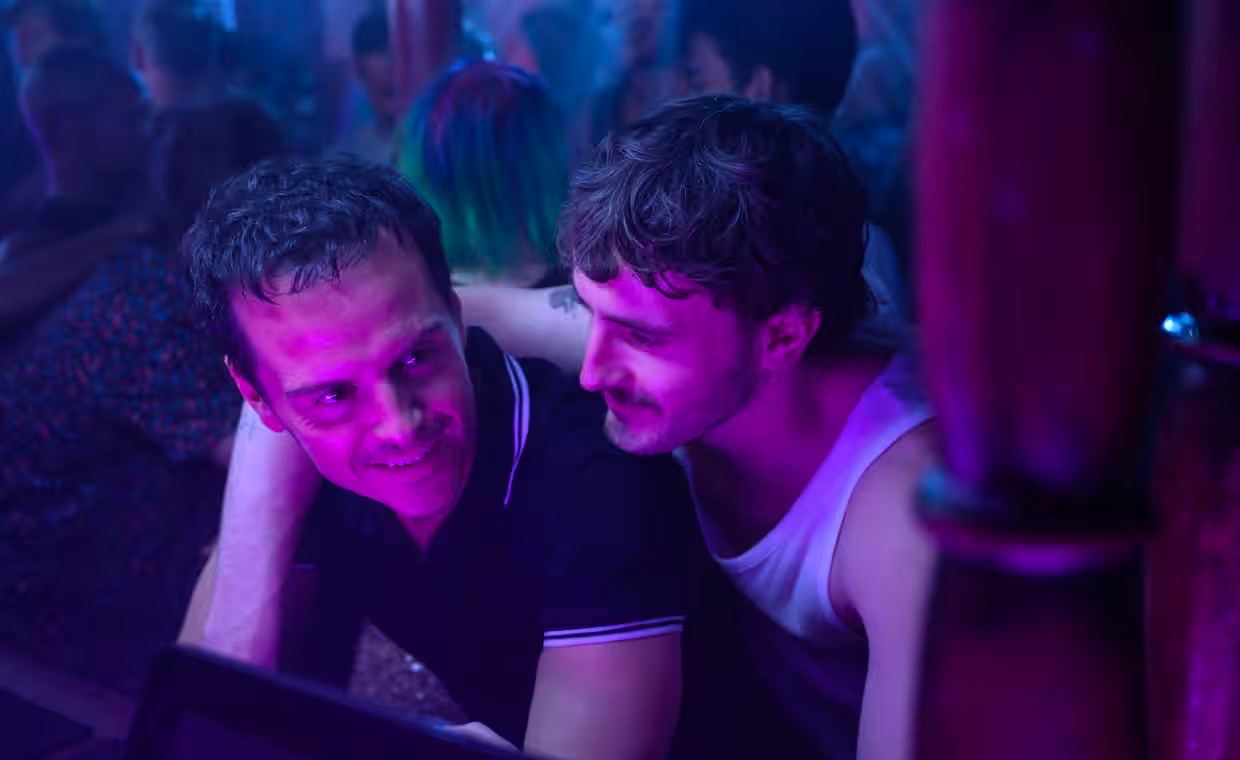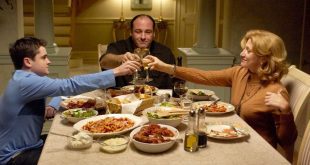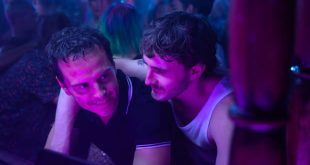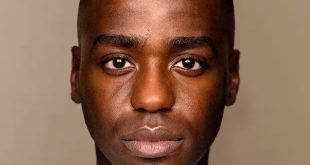When Andrew Haigh was shooting his new film, All of Us Strangers, in his parents’ old house in Croydon, something strange began to happen. “I started getting eczema again, and I’d not had eczema since I was a kid,” says the director, who is now 50. “It was coming up in the exact same places. I thought, ‘What the fuck is happening to me?’ I feel there is a sense that your body remembers trauma. Somehow things get almost embedded in your DNA, and they find ways to leak out.”
In All of Us Strangers, this leakage happens to Adam, a 46-year-old gay man exquisitely played by Andrew Scott. He’s a blocked, depressed screenwriter whose parents died in a car crash when he was 12, and who lives in a mysteriously empty tower block in London. One night after a fire alarm, a younger man called Harry, played by Paul Mescal, drunkenly comes to his door. Although Adam initially rejects him, the pair later embark on the love affair he has always yearned for – and Mescal and Scott are explosively convincing as a couple. “Casting is like running a dating agency,” says Haigh. “I have to be careful to pick the people who will be good together.” When Adam decides to return to the house he grew up in, he discovers that his mum and dad – played by Jamie Bell and Claire Foy – are still living there, the same age they were when they died, in a perpetual 1987.
The film – which won best film and best director at the British Independent Film awards in December – somehow blends a love story, a ghost story, and a time-flipped coming-of-age narrative. The result is a masterful exploration of loneliness and grief, the relationship between children and their parents, and a demonstration of the fact that time, far from healing, can bring childhood trauma rearing up stronger than ever in middle age. But it’s also a tender, aching expression of the insatiable human need for love and connection, which Haigh depicts as being so powerful that it can annihilate the border between life and death. “All the people in the film are longing for something – to be understood, to be known,” Haigh says.
All of Us Strangers is a “very free” adaptation of a Japanese novel called Strangers by Taichi Yamada (who died last month aged 89), which the film-maker wrote during the pandemic while living in Los Angeles. “There’s a pandemic emotion at the heart of it,” he says. “We all spent a lot of time staring out of the window, didn’t we?” Sitting in a Soho hotel suite, Haigh – whose previous films include Weekend and 45 Years, and who also made the TV series Looking and The North Water – was keen to make the film “as personal as I could. It’s about someone having a reunion with their own past so it made sense that I had to do the same thing. As I was writing about the home Adam goes back to, I started thinking about my own childhood home, and when we were talking about where to shoot I thought, ‘I’ll just go down and see if it’s still there.’ I couldn’t remember where it was on the street because I left there when I was nine or 10” – when his parents divorced – “but I had the photo that Adam lifts up in the film, with Claire Foy put in instead of my mum.”
Haigh found the house and the owner agreed to let him film there. “It was a strange choice, emotionally, because I knew it wouldn’t be the easiest place to be. But I wanted the film to have a certain honesty and vulnerability, to feel grounded in some kind of reality. The only way was to make it my own reality, as a way to make it specific in the hope that it would speak to all those details of life that end up feeling universal.”
It’s the hardest thing, about being queer within a family – you’re not like your parents. And you have a secret
The reality he’s talking about is that of a middle-aged gay man who was a young teenager at the end of the 80s, when the Aids crisis unleashed a wave of savage homophobia (a survey in 1987 discovered that 75% of the UK thought homosexuality was “always” or “mostly” wrong). “I wanted it to be very specific about a certain generation of gay person, which was our generation,” Haigh says when I tell him I’m also gay, and a year younger than him. “It wasn’t an easy time. Growing up, I felt, ‘If I’m going to become a gay person I’m not going to have a future, and the only other alternative is not to be gay’ – which of course you can’t not be. So I wanted to tell that story.”
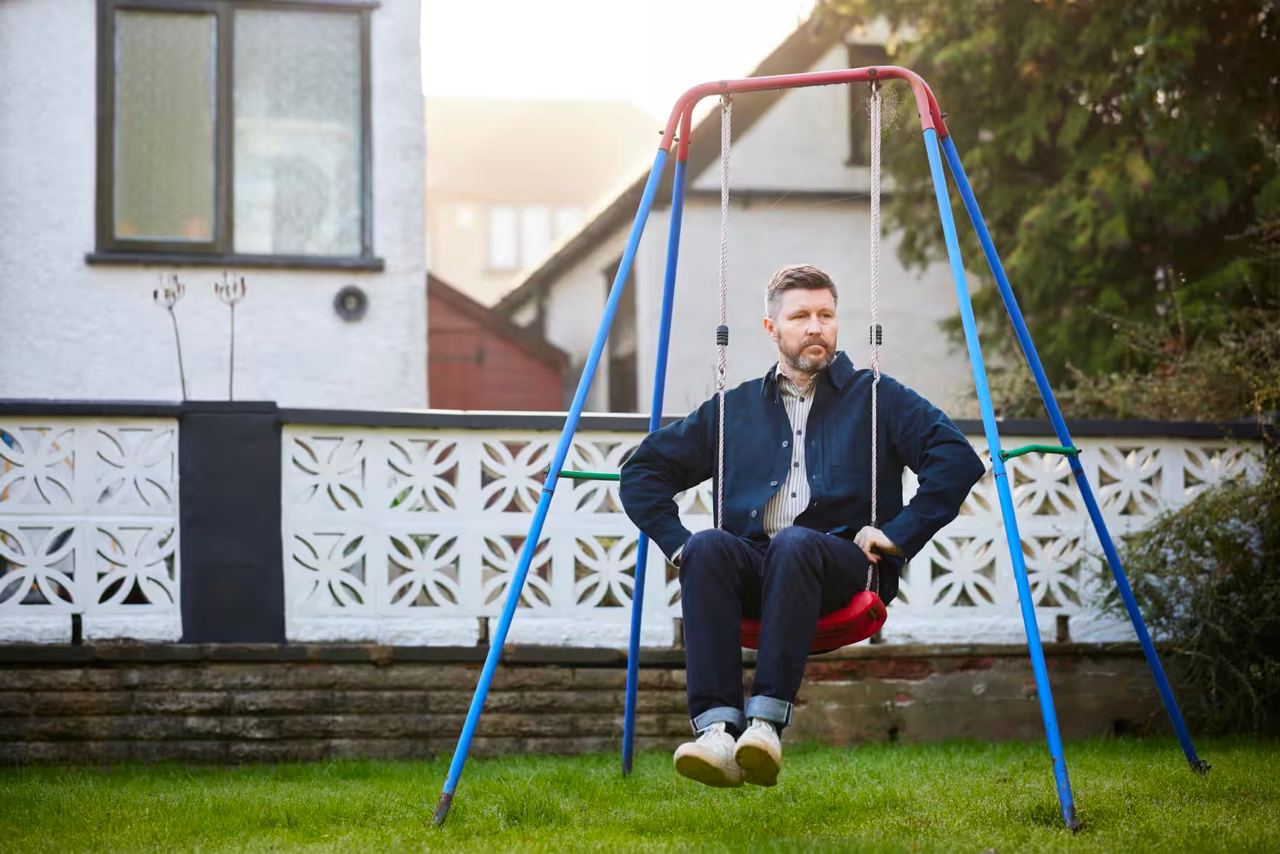
All of Us Strangers depicts someone struggling with the lasting effects of a childhood disfigured not only by bereavement, but also by prejudice and hatred. “There’s a generation of queer people grieving for the childhood they never had,” Haigh says. “I think there’s a sense of nostalgia for something we never got, because we were so tormented. It feels close to grief. It dissipates, but it’s always there. It’s like a knot in your stomach.”
Much of All of Us Strangers’ emotional power comes from the brutally repressed Adam attempting to dispel his feelings of shame and isolation in order to be seen and loved for the person he truly is. To this end, he takes the opportunity, denied to him by their death, to come out to his mum and dad, separately. His mum is shocked – “Isn’t it a very lonely life?” – and worried about Aids. His dad, not unkindly, says: “We always knew you were a bit tutti-frutti.” Says Haigh: “The coming-out scenes are about the importance of being known. It’s very hard to move through life if you feel you’re not understood. And if you’re not understood, you feel you’re alone.”
Adam asks his father why he would never come into his room to comfort him when he was crying after being bullied at school – something else Haigh suffered. “I was about nine, and the kids around me knew something was different about me before I really did,” he says. “So you’re like, ‘I don’t understand why you’re calling me these names.’ But they could feel it somehow. When my mum saw the film, she was like, ‘Is this what happened to you?’ And I was like, ‘Yes.’ If you’re a queer kid, you don’t want to tell your parents you’re being bullied, because they’re going to think you’re different, and that’s the last thing you want. It’s the hardest thing, sometimes, about being queer within a family – you’re not like your parents and you have a secret.”
